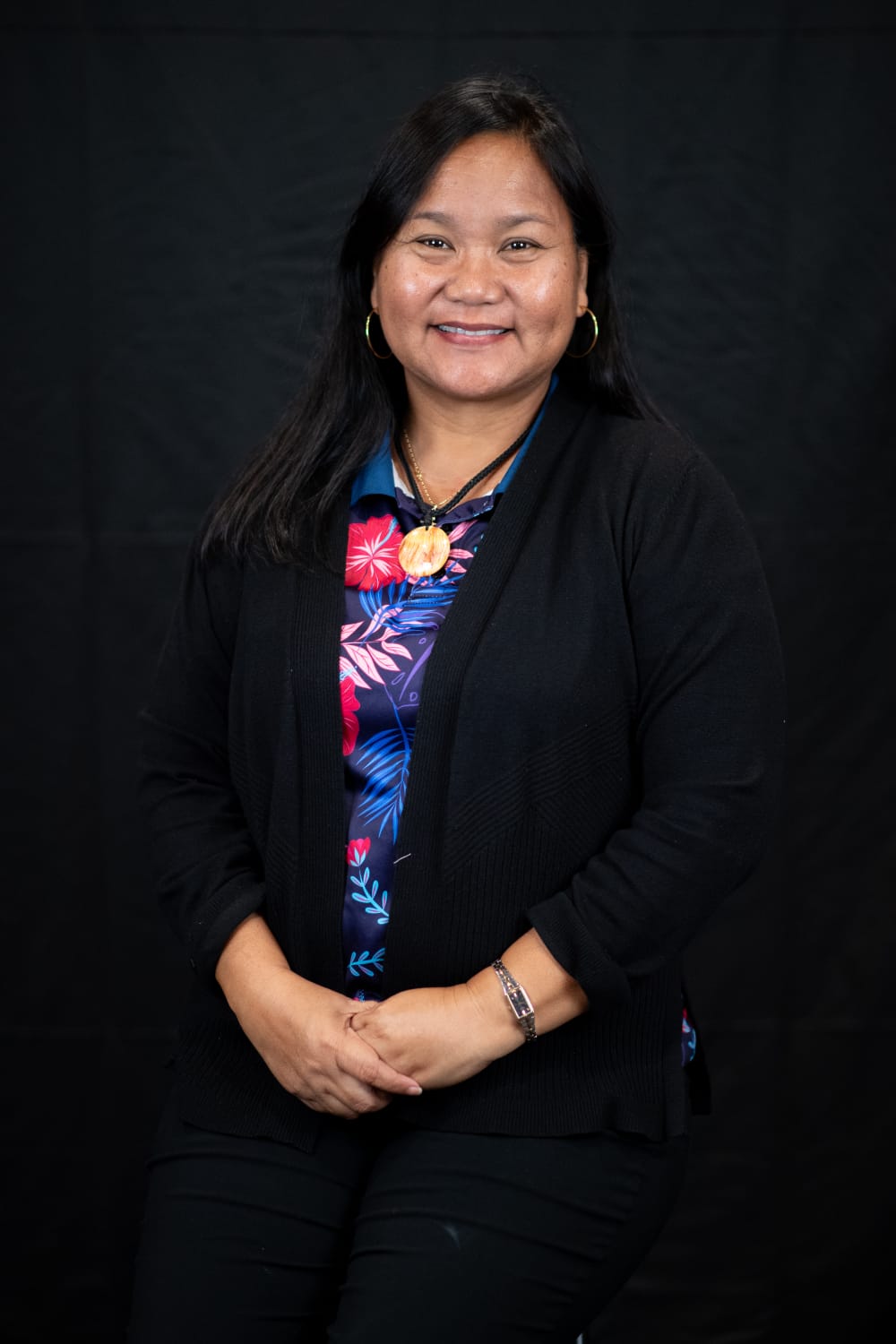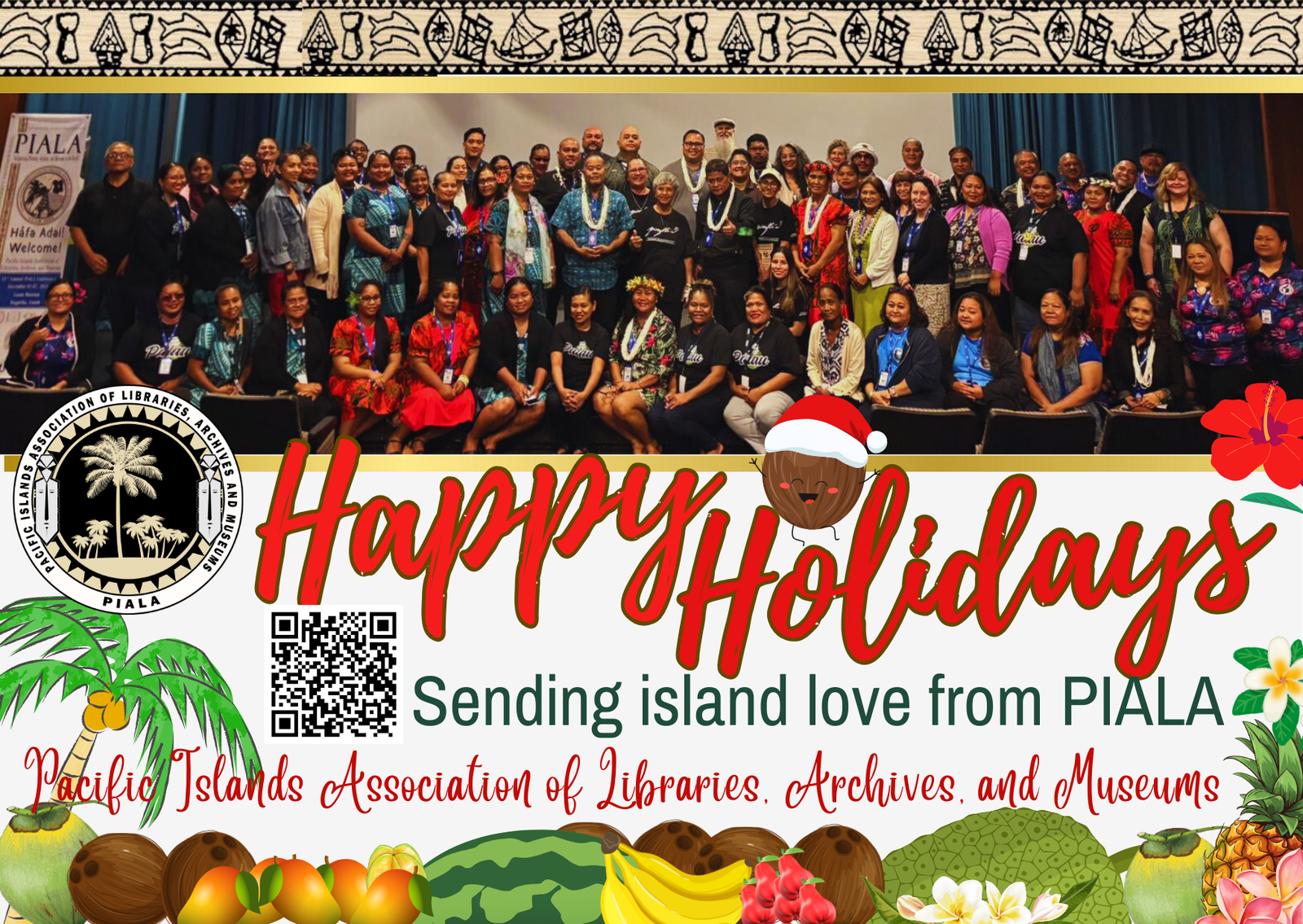
Erlinda C. Naputi
Message from the PIALA President/PIALA Conference Chair Erlinda C. Naputi delivered during the Opening Ceremony of the 33rd Annual Pacific Islands Association of Libraries, Archives, and Museums Annual Conference held at the Guam Museum in Hagåtña, Guam on Tuesday, December 3, 2024
BUENAS DIAS YAN HAFA ADAI, Gof bonita esta pagu na oga’an na mandana hit para ta silebera esti na konfriansia para to abiba yan to na opun huyung i kottura, lenguahi, yan estorian i man mofona na taotao-ta guini gi islan pasifo.
Yan para to fan agoti kanai uno yan otro para i manaolek taotao ta gine giya isla’n pasifiko. Malagu yu na bai hu gaogao un dungkulu na si yu’us ma’ase i presidenti i depatamentu’n i CHamoru Affairs as Melvin Won-Pat Borja, i chairman i Guam Museum Foundation as David Tydingco, i administradot at Leona Mendiola-Young, yan todu i ingerat siha ni man manayuda muna posible este i confriansia ta pagu na si mana.
It is with great pleasure that I welcome you all to the beautiful island of Guahan. It is an honor to be joined this morning by our esteemed PIALA members:
• the Chairman of the Guam Museum Foundation, Mr. David Tydingco,
• our co-host for the 33rd Annual PIALA conference, President Melvin Won Pat-Borja of the Department of CHamoru Affairs,
• the President of Guam Community College Dr. Mary Okada,
• Dr. Monique Storie, Dean of University Libraries at the University of Guam RFK Library,
• Dr. Kelly Marsh-Taitano, Curator of the Guam Cultural Repository,
• acting director for the Guam Public Library System Angie Taitague,
• the Hawaii State Librarian, Ms. Stacey Aldrich,
• and all our other distinguished guests present here this morning.
I would like to take this opportunity to recognize the 33rd Annual PIALA members present here today. I’d like to ask each island representative to please stand and be recognized, as I call your islands:
• Alii from the Republic of Palau
• Mogethin from the island of Yap
• Ran Anim from island of Chuuk
• Kaselele from the island of Pohnpei
• Lemwo from the island of Kosrae
• Iakwe from the Republic of the Marshall Islands
• Aloha from the State of Hawaii
• Hafa adai from the beautiful Mariana Island of Guahan
• And Buenas, Hafa adai, yan Tiroow from the other beautiful islands in the Marianas: Saipan, Luta, Tinian and the Northern Islands!
The role of libraries, archives, and museums in the Pacific is crucial for Indigenous communities today. As stewards of these institutions, we are responsible for ensuring the ongoing relevance of our culture, history, and language for the benefit of our future generations.
I watched new technologies emerge throughout the 32 years I spent at the Joeten-Kiyu Public Library. I recently read an article by Nick Tanzi published in the Digital Librarian, stating that questions about libraries’ continuing relevance have often accompanied the emergence of new technologies. Questions such as, “Why do I need the library when I have”:
• The World Wide Web (1993).
• Google (1998).
• Amazon/Kindle/eReader (2007).
• The iPad (2010).
• ChatGPT (2023).
Libraries have consistently embraced new technologies to enhance community service. As we enter the era of artificial intelligence, similar skepticism may arise. However, a closer look at libraries’ core functions reveals that their value has only grown.
While technology continues to evolve at an unprecedented pace, we must recognize the irreplaceable value of our local indigenous culture, language, and history.
The Pacific Islands Association of Libraries, Archives, and Museums stands as a testament to the rich and diverse cultural heritage of the Pacific Islands. Our organization and dedicated members are pivotal in preserving and promoting the indigenous languages, cultures, and histories that form the bedrock of the Pacific Islander people’s identity. Through our tireless efforts, PIALA ensures that the unique traditions, stories, and knowledge of the Pacific Islands are not lost to the sands of time but are instead celebrated, cherished, and passed on to future generations.
The Pacific Islands, with their breathtaking natural beauty and vibrant cultures, face many challenges, including the devastating effects of climate change, the lingering impacts of colonialism, and the pressures of globalization. In the face of these challenges, PIALA and its members stand as beacons of resilience, working tirelessly to safeguard the cultural heritage of the Pacific Islands. Our work is not merely about preservation; it is about empowerment, ensuring that the voices and perspectives of Pacific Islander people are heard and respected.
We must take immense pride in protecting, prioritizing, promoting, and preserving our culture, cultural sites, natural resources, language, and history. We have witnessed the devastating effects of super typhoons as we are at the forefront of global warming. But we are resilient people of the Pacific, drawing strength from our ancestors and our land. We are as strong as the Latte Stone in the Marianas and as enduring as the tall Ka trees in the Yela Forest in Kosrae. The Nan Madol in the beautiful Pohnpei islands is a testament to our ancestors’ ingenuity and architectural prowess (prau·uhs). The value of our culture and traditions, such as the Stone Money in Yap, is immeasurable, surpassing any material wealth. The pristine blue waters surrounding the Rock Islands in Palau reflect the beauty and humility of our Pacific people. Our islands are home to unique eecosystems where humans and nature coexist harmoniously, such as the famous Shark City and the Jellyfish Lake in Palau. The President of Palau, Honorable Surangel Whipps, Jr., in his speech at the 32nd PIALA conference, humorously remarked that even the sharks in Palau are vegetarian! The major shipwreck from World War II that rests in the beautiful lagoon in Chuuk is a poignant reminder of our history and is a world-renowned diving destination. Our Pacific Islander communities are woven together by the unique stories of our history, just like the intricate navigational stick charts used by the Marshall Islands to navigate the vast Pacific Ocean.
Indigenous languages from each respective island, often profoundly intertwined with oral traditions, serve as vessels of cultural knowledge passed down through generations. These languages carry our ancestors’ wisdom, values, and worldviews within them.
The importance that each of us, as PIALA members, places on our respective islands cannot be overstated. As indigenous people, we are integral to our libraries, archives, and museums. Each of us present here is entrusted with ensuring the delivery of quality services that each of our institutions provides to our communities. We must ensure that Indigenous peoples have access to information that accurately and respectfully reflects our cultures, knowledge, and protocols. Our museums must collect, preserve, and display objects of artistic, cultural, or scientific significance, and our archives must preserve our history.
I am deeply moved by the words of one of the awardees from the 2024 Association of Tribal Archives, Libraries, and Museum ATALM conference, who stated that we are not the gatekeepers of our institutions but rather their guardians. This profound distinction highlights our responsibility to nurture and protect our institutions’ legacy. As guardians, we must tirelessly champion the significance of our unique culture, language, and captivating stories from our islands. We must instill in our people a deep appreciation for their heritage and empower them to carry it forward with pride.
As the president of PIALA, I want to express my deepest gratitude to the CNMI Governor and Lt, Governor, Arnold Palacios and David Apatang, Guam Governor and Lt. Governor Lou Leon Guerrero and Joshua “Josh” Tenorio, Charles V. Cepeda, the Chairman of the Commonwealth Library Council, and the rest of the Library Council members. Their dedication to advancing libraries, archives and museums and their commitment to our mission has been truly inspiring.
I extend my heartfelt appreciation to my dedicated colleagues at Joeten-Kiyu Public Library, both those diligently holding down the fort back home and those who have joined me here today.
I want to recognize all the PIALA delegations here today. Your presence and participation in this conference are a testament to the strength and unity of our Pacific community and PIALA.
I would like to express my sincere gratitude to the many individuals who have contributed to the success of our 33rd Annual PIALA conference. I extend my thanks to
• President Melvin Won-Pat Borja,
• Leona Mendiola-Young, and their exceptional team at the Guam Museum.
Additionally, I would like to acknowledge the invaluable support of
• Acting Director Angie Taitague, June Afflague, and their dedicated team at the Guam,
• Public Library System,
• Dr. Kelly Marsh-Taitano and Nicole DeLisle Duenas and their dedicated team at the Guam Cultural Repository,
• and the rest of the PIALA planning committee.
I also wish to recognize the commitment of the PIALA executive board. Vice President Abel Noah Republic of Palau, Treasurer Jef Libao of Guahan, and Secretary Suciana Mark, Republic of the Marshall Islands, and the PIALA executive board.
My heartfelt appreciation goes out to the numerous individuals who have generously offered their time, energy, and expertise to make our PIALA conference a resounding success.
I extend my deepest gratitude to our incredible sponsors, whose generous contributions have made this conference possible. Thank you for believing in our vision and for helping us make this event a reality.
To my husband, Martin Naputi, I extend my deepest gratitude. Your unwavering support and belief in me have been the cornerstones of my journey as President. Thank you for being my rock, confidant, and unwavering champion.
In closing, may the chapter of your book that unfolds during the 33rd Annual PIALA conference be enriched with invaluable knowledge and insights. May it serve as a guiding light as you safeguard your respective institutions. Moreover, may this chapter be adorned with the names of your fellow conference participants, fostering enduring connections and strengthening our Pacific network. By cultivating collaboration and mutual support, we can amplify our collective impact and achieve even greater heights.
In the compelling narrative of a movie based on a true story, Rob Peace, a particular line deeply resonates with me: “I just don’t believe that you can ever be facing the wrong direction if you’re standing by your people.” This sentiment encapsulates a powerful truth that I believe we should all embrace. Let us stand firmly and resolutely by our people. By doing so, we fortify our collective strength and ensure that our shared journey is guided by unity and purpose. Together, we will continue to be the unwavering voice of our cherished institutions, advocating for their progress and prosperity.
Pues mungga man maleffa ni i confi’anca na man ma intrega hit para ta protehi i kuturata, i lenguahi, yan i timepo man mofona para ta na opan huyung i tinengota.
Let us embrace the spirit of solidarity and unwavering commitment to our people and our institutions. Together, we will navigate the path ahead steadfastly, ensuring a vibrant future for generations to come.
We may be divided by tide, but WE ARE united by pride. And although we are a dot on the world map, our rich culture, history, UNIQUE LANGUAGES, and respect for our Pacific people encompass the entire globe.
In the spirit of our shared heritage and our common goals, I say: Un guinaiya, un kurason, inafama’olek, yan inakomprende. Biba Marianas, Biba Micronesia, Biba Taotao Pacifico, Biba PIALA!
Sulang, Kammagar, Kinisou, kalahngan, kuloh, kommol Tata, mahalo, Si Yu’us ma’ase, ghilisow, and thank you .
PIALA’s President and Chair of this year’s Conference is a daughter of the Northern Marianas, Mrs. Erlinda Cabrera Naputi is the Library Director/CNMI State Librarian of the Joeten-Kiyu Public Library, Saipan.












